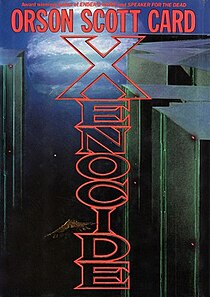An error is an action which is inaccurate or incorrect. In some usages, an error is synonymous with a mistake. In statistics, "error" refers to the difference between the value which has been computed and the correct value. An error could result in failure or in a deviation from the intended performance or behaviour.
The Culture is a fictional interstellar post-scarcity civilisation or society created by the Scottish writer Iain M. Banks and features in a number of his space opera novels and works of short fiction, collectively called the Culture series.
Sentience is the capacity to feel, perceive, or experience subjectively. Eighteenth-century philosophers used the concept to distinguish the ability to think (reason) from the ability to feel (sentience). In modern Western philosophy, sentience is the ability to experience sensations. In Eastern philosophy, sentience is a metaphysical quality of all things that require respect and care.
Business intelligence (BI) comprises the strategies and technologies used by enterprises for the data analysis of business information. BI technologies provide historical, current and predictive views of business operations. Common functions of business intelligence technologies include reporting, online analytical processing, analytics, data mining, process mining, complex event processing, business performance management, benchmarking, text mining, predictive analytics and prescriptive analytics. BI technologies can handle large amounts of structured and sometimes unstructured data to help identify, develop and otherwise create new strategic business opportunities. They aim to allow for the easy interpretation of these big data. Identifying new opportunities and implementing an effective strategy based on insights can provide businesses with a competitive market advantage and long-term stability.
Computer science is the study of the theoretical foundations of information and computation and their implementation and application in computer systems. One well known subject classification system for computer science is the ACM Computing Classification System devised by the Association for Computing Machinery.

Xenocide (1991) is a science fiction novel by American writer Orson Scott Card, the third book in the Ender's Game series. It was nominated for both the Hugo and Locus Awards for Best Novel in 1992. The title is a combination of 'xeno-', meaning alien, and '-cide', referring to the act of killing; altogether referring to the act of selectively killing populations of aliens, a play on genocide.
A zero-player game or no-player game is a game that has no sentient players.
Zombie is traditionally an undead person in Haitian folklore and is regularly encountered in fictional horror and fantasy themed works.
Social computing is an area of computer science that is concerned with the intersection of social behavior and computational systems. It is based on creating or recreating social conventions and social contexts through the use of software and technology. Thus, blogs, email, instant messaging, social network services, wikis, social bookmarking and other instances of what is often called social software illustrate ideas from social computing.
The expression computational intelligence (CI) usually refers to the ability of a computer to learn a specific task from data or experimental observation. Even though it is commonly considered a synonym of soft computing, there is still no commonly accepted definition of computational intelligence.

Robota (2003) is an illustrated book by Doug Chiang and Orson Scott Card about a mysterious fourth planet of the solar system named Orpheus. In a time before the events of the book, an alien race known as the Olm came to Orpheus and warned the people, explaining that their planet will crash into Earth in several thousand years. The Olm gave humans very advanced technology and the ability to create robots with artificial intelligence. But over the centuries, entropy and mismanagement have taken their toll. The humans have reverted to a preindustrial existence in a world populated with chimerical beasts such as the saurian jodphurs, relying on bio-sciences for whatever support they can derive. With their mysterious leader, Font Prime, silenced, the robots have fallen under the baneful influence of Kaantur-Set, who directs a program of human extermination. But the robots themselves are on the point of extinction, as their technologies of reproduction no longer work. In this dire end of times, the story follows the adventures of Caps, a human who wakes up inside a metal capsule with no memory of his past.

Star Control 3 is a video game developed by Legend Entertainment. Legend were hired by Accolade to create a sequel to Star Control II when the original creators Toys For Bob expressed no interest in creating the sequel with the same budget as Star Control II. It was released for DOS and the Macintosh in 1996, and re-released in 2011 with Windows support on GOG.com.
The following outline is provided as an overview of and topical guide to artificial intelligence:
Sentiocentrism, sentio-centrism, or sentientism is the philosophy that sentient individuals are the center of moral concern. The philosophy posits that all and only sentient beings have intrinsic value and moral standing, thus they are regarded as moral patients; while the rest of the natural world only has instrumental value. Both humans and other sentient animals have rights and/or interests that must be considered.
AI takeover is a common theme in science fiction. Fictional scenarios typically differ vastly from those hypothesized by researchers in that they involve an active conflict between humans and an AI or robots with anthropomorphic motives who see them as a threat or otherwise have active desire to fight humans, as opposed to the researchers' concern of an AI that rapidly exterminates humans as a byproduct of pursuing arbitrary goals.
This glossary of artificial intelligence terms is about artificial intelligence, its sub-disciplines, and related fields.
Sentientism is an ethical philosophy according to which all sentient beings deserve moral consideration. In extending compassion to non-human animals as well as to any potential artificial or alien sentient beings, sentientism is an extension of humanism. As in humanism, supernatural beliefs are rejected in favour of critical, evidence-based thinking.


